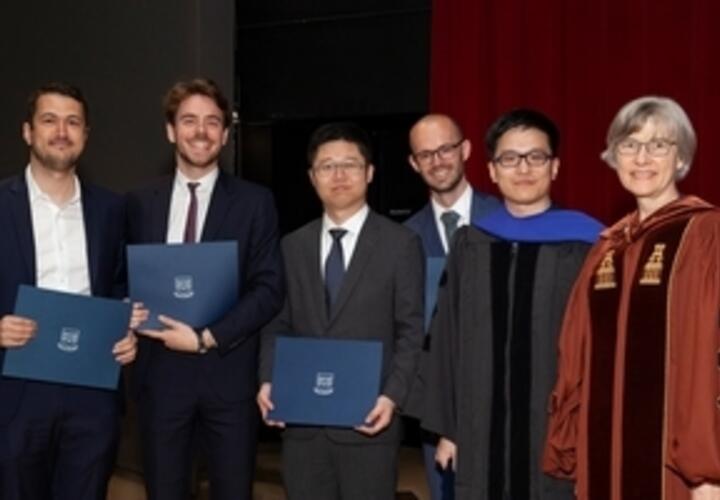2019 Trimis Prize Recipients

The George Trimis Prize is awarded annually to doctoral students in the Department of Economics who demonstrate exceptional academic achievement. The 2019 prize was bestowed upon five graduating students by Lynn Cooley, Dean of the Graduate School of Arts and Sciences, at the Graduate School Convocation on May 19th. This year’s recipients are Taha Choukhmane, Fabian Eckert, Wayne Yuan Gao, Joachim Hubmer, and Yukun Liu.
The George Trimis Prize was established in May 2003 in memory of a doctoral student in the Department of Economics who lost his battle to cancer. In recognition of the extraordinary example that Trimis set, the prize is awarded to students whose dissertations demonstrate exceptional and distinguished achievement. George Trimis was awarded the first prize before his death.
Below is a list of this year’s recipients, their dissertation titles, their advisers, and a brief abstract.
- Taha Choukhmane, ”Essays on Saving and Investment Behavior”
Advisers: James Choi, Nicholas Barberis, Costas Meghir, Cormac O’DeaChoukhmane explains two perplexing facts about saving behavior, high savings rates in China and the tendency for employees to choose the default retirement savings option. By careful analysis of novel data, he concludes that employees offset high automatic savings by reducing personal saving and Chinese households increase saving to offset the impact of the one-child policy on old age support.
- Fabian Eckert, ”Essays in Economic Geography and Inequality”
Advisers: Costas Arkolakis, Giuseppe Moscarini, Samuel Kortum, Michael Peters, Fabrizio ZilibottiEckert provides a novel explanation for the recent increase in the wage premium for U.S. college graduates. The information technology revolution has reduced the cost of transporting business services. This change has allowed regions to specialize in these activities and export them to other regions, at the same time increasing the wages of the skilled workers that provide the services.
- Wayne Yuan Gao, ”Essays on Network and Panel Modeling”
Advisers:Peter Phillips, Xiaohong Chen, Larry Samuelson, Philip Haile, Attila AmbrusGao studies models with many individuals linked by a network, sharing risk, and having local information about each other. He derives theoretical properties of the models and methods for their statistical verification. He applied his methods to data on Thai villages. An example of a qualitative result is that people centrally located in a risk sharing network tend to bear risk.
- Joachim Hubmer, ”Essays on Macroeconomics and Inequality”
Advisers: Giuseppe Moscarini, Tony Smith, Per KrusellHubmer verifies empirically explanations he provides for increasing inequality in the U.S. distribution of income and wealth. The aggregate labor share of income has declined because of a fall in the price of labor saving capital goods. Individual workers suffer severe drops in income from job loss. Wealth inequality increases because of high asset returns and a decrease in tax progressivity.
- Yukun Liu, ”Labor-Based Asset Pricing”
Advisers: Toby Moskowitz, Aleh Tsyvinski, Stefano Giglio, William Goetzmann, Andrew MetrickLiu links job search with asset-pricing to gain insights that he tests empirically using an original data source. A filled job vacancy generates a shared rent. The expected present value of the firm’s share of this rent is an asset with a value depending on the firm’s discount rate. Hence we may infer this rate from the firm’s search effort for employees.
